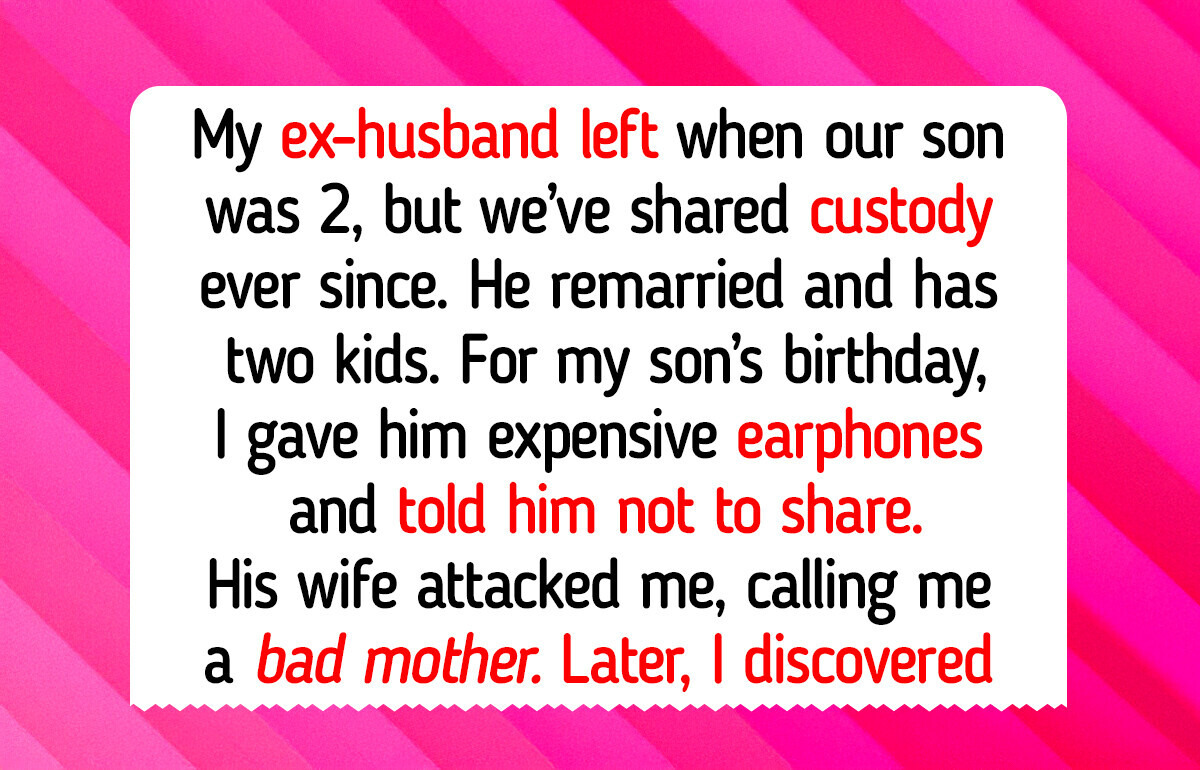If have the receipt for the earbuds inform the ex need them returned to your son ASAP or can always report them stolen, or take ex to court about fact he's allowing his wife to take things from Liam for their kids that they didn't purchase
I Refuse to Give My Son’s Belongings to My Ex-Husband’s Kids—Absolutely Not

Hey Bright Side,
I’m Emily, 38, and I’ve shared custody of my son, Liam, ever since my ex-husband left when Liam was 2. He spends weekends at his dad’s house, which is now shared with his new wife and her two children.
For Liam’s 12th birthday, I bought him high-quality earphones. I told him clearly not to share them with anyone, because hygiene matters: I didn’t want him getting sick or catching colds from germs. I thought it was a reasonable rule.
But as soon as his stepmom found out, she called me a “bad mother,” claiming I was making excuses and being selfish. I was shocked.
Later, I discovered she had already taken Liam’s earphones and let her own kids use them behind my back. I felt betrayed and furious, not just for the gift, but for the disrespect toward me as his parent.
I haven’t confronted them yet, because I’m torn between staying calm or going full drama mode. Should I let it go for the sake of peace, or stand my ground and demand respect for my rules?
— Emily
Here is what we think, Emily.
Emily, dear, it’s completely normal to feel protective over your child’s belongings, especially in a blended family. Instead of focusing on the conflict itself, try to center your approach on teaching your child values and making your reasoning clear.
Start by calmly explaining why certain items are just for them. For example, you might say, “These earphones are yours because sharing can spread germs, and I want you to stay healthy.” Framing it as care rather than control often makes children (and adults) more receptive.
At the same time, encourage respect for personal property. Praise Liam when he follows the rules and gently remind him when he forgets. Modeling consistent behavior will help him understand the importance of responsibility.
When it comes to communicating with your ex or stepfamily, keep the tone factual and neutral. You can:
- Explain your rules clearly without blaming anyone.
- Offer alternatives for shared activities or items if needed.
- Focus on what’s best for your child rather than engaging in arguments.
Finally, remember that the main goal isn’t to “win” against step-siblings or their parents, it’s to help your child understand boundaries, hygiene, and self-respect. Teaching these lessons calmly and consistently will have a lasting impact, even if tensions flare in the short term.
Comments
My relationship had ended and I felt my hope slipping away. I discovered drstanlyspelltemple@gmail.com, so I chose to perform his guaranteed spells. My ex-boyfriend came back to me within 24hours showing greater love and commitment than before. This is the real deal — private, safe, and life-changing.
Dude for real grow up your ex LEFT and you do "spells" to get him back?? WHY? Have some self worth. If someone leaves me GOODBYE. I'd never stoop so low!!
Related Reads
I Cut Off My Parents After They Demanded My Inheritance—and I Don’t Regret It

I Refuse to Be Treated Like the Family Nanny—And My Mom Chose Her Boyfriend Over Me

My Coworker Stole My Promotion, but I Was Already Three Steps Ahead

15 Moments That Show Kindness Is Quiet but Changes Everything

16 Moments That Remind Us to Stay Kind Even If the World Turns Ice Cold

I Refuse to Forgive My Wife for What She Did to My Son

20 Stories That Remind Us to Stay Kind Even When Life Stops Playing Fair

I Refuse to Help My Pregnant Sister, and I Don’t Feel Guilty

I Funded My Wife’s Luxury Demands—She Made Me Regret Every Penny

I Refused to Give Up My Baby, So My Mom Exposed a Terrible Secret

14 Times Reality Proved to Be a Better Screenwriter Than Hollywood Could Ever Be

My Neighbor Refused to Help My Autistic Son, She Wasn’t Ready for My Revenge




